Step10: Keeping Your Side Clean
Step 10 keeps our relationship with others in good order. Here is Step 10:
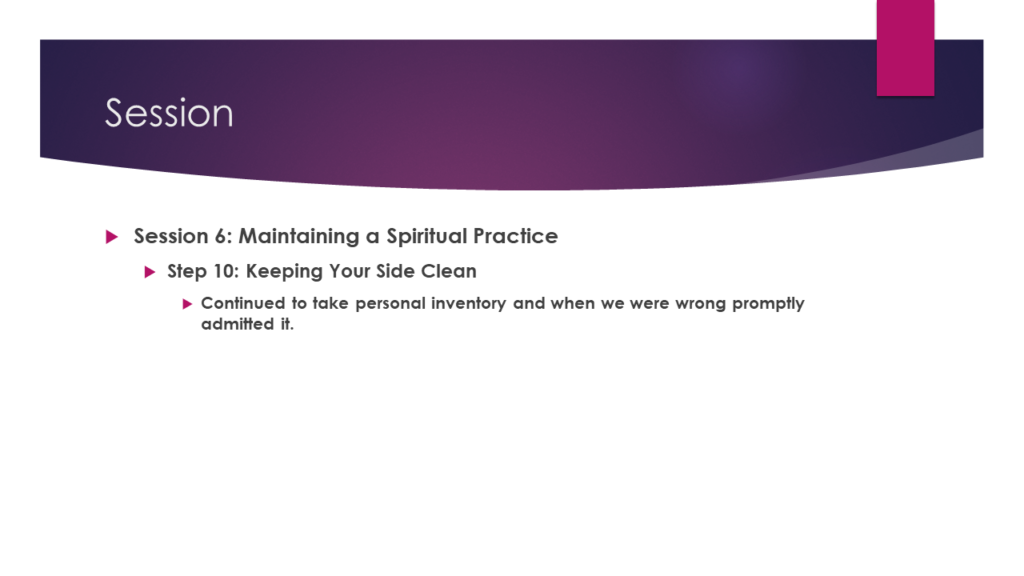
“Continued to take personal inventory and when we were wrong promptly admitted it.” The essence of this step is ongoing, continual self-awareness. The Buddhists would call this attitude, “mindfulness.” If we would grow spiritually, we can no longer be satisfied by merely drifting through life unaware, wreaking havoc as we go. The tenth step inventory works like a critical third eye, standing apart from our thoughts and actions, alert for any signs of the old self-delusions that used to control our behavior. There are two kinds of inventories we can use with the tenth step: a spot-check inventory and a periodic inventory. Let’s examine the spot-check inventory first.
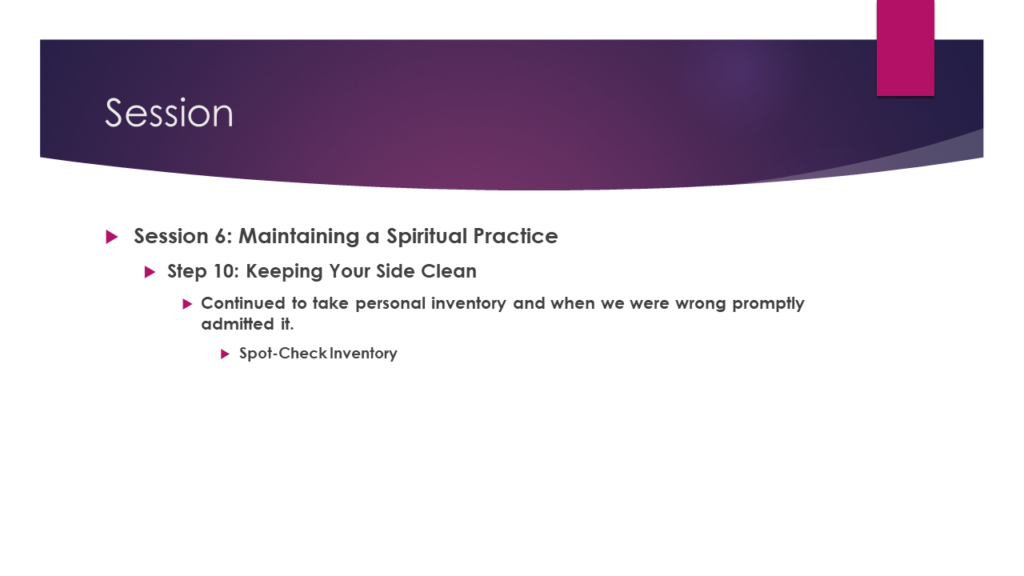
We take this ongoing inventory continually throughout our day. It’s actually quite simple. All we have to do is pause for a second and ask ourselves, “Wait a minute—what’s going on here?” It’s our opportunity to take a step back from any situation and observe it from a bit of an emotional distance. But, when we’re in the middle of an emotional situation, how can we possibly manage to look at it objectively and impassively? That, it turns out, is the most critical question in all of our spiritual lives. It requires us to develop an awareness of a fundamental psychological principle that we may not even be conscious of. Here it is:
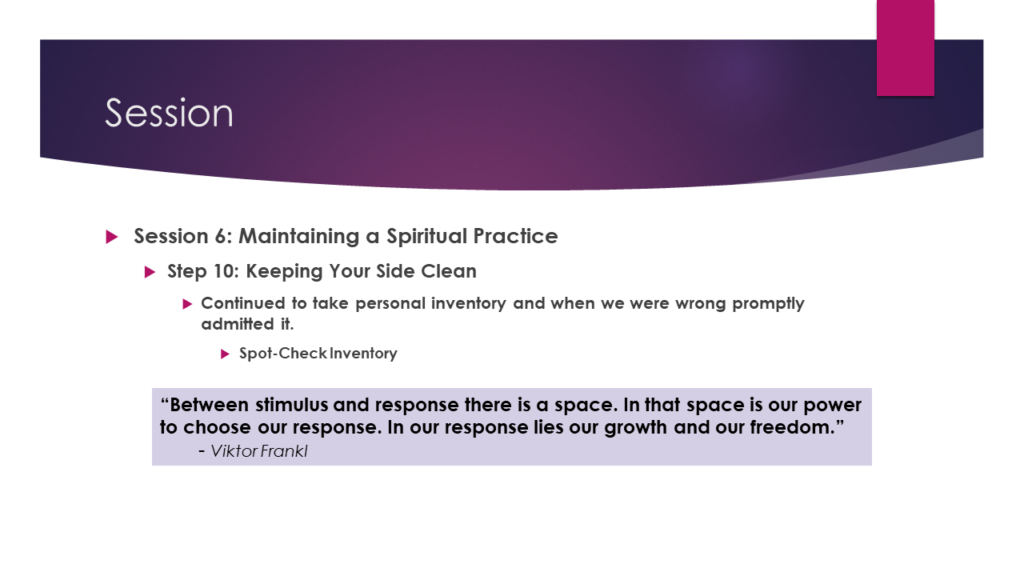
“Between stimulus and response there is a space. In that space is our power to choose our response. In our response lies our growth and our freedom.” That’s a quote from psychologist Viktor Frankl. Stimulus is our environment affecting us; response is how we affect our environment. You’ve heard the old aphorism, “Count to ten”? That’s asking us to be aware of that critical space between feeling and doing. If we want to grow spiritually, we’re going to have to avoid “knee-jerk” reactions completely. We can’t afford them. “How,” you may ask, “can I do that? When I’m triggered, I just react.” Here’s where the tenth step inventory serves as a school to teach our minds how and when to react appropriately. How do we know that we’ve been triggered? In fact, it’s deceptively easy. Just be aware that you’ve been disturbed. That’s it.
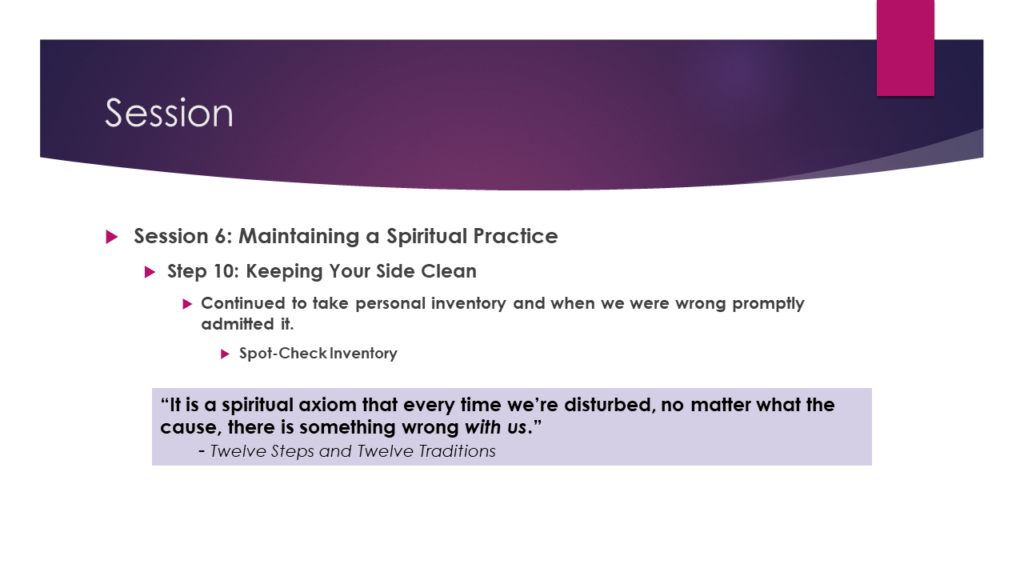
“It is a spiritual axiom that every time we’re disturbed, no matter what the cause, there is something wrong with us.” What kinds of “disturbance” do we mean? We’re talking about any kind of emotional upset, be it anger, fear, anxiety, jealousy, or pride. There are no exceptions. Spiritual growth involves training ourselves to hear virtual warning bells going off in our heads whenever we experience strong emotions. Instead of charging forward or away in a “fight or flight” response, we need to train ourselves to stop! There’s never any downside to taking advantage of that stimulus-response space. Our amygdala—the primitive brain—causes thoughtless reactions. The stimulus-response space allows our rational brains to engage, and it’s our rational brains that understand our powerlessness. Making the leap from reaction to decision is not natural. It requires training and practice.
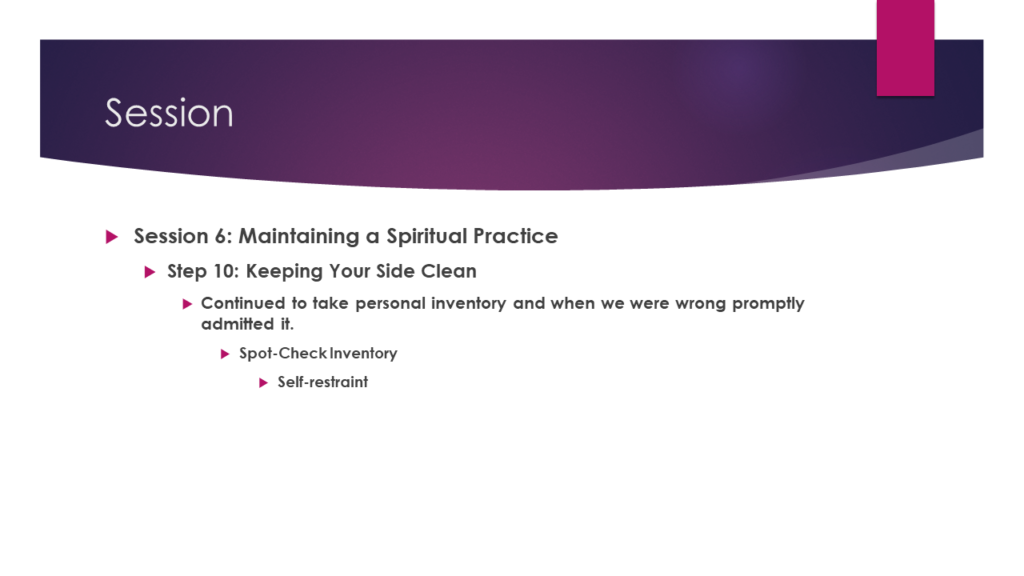
Self-restraint is what the tenth step is all about. Some occasions—like imminent danger—require immediate reaction. For the vast majority of occasions, when we’re used to reacting, just don’t. If we can step into that stimulus-response space, we can avoid having to make excuses for our bad behavior.
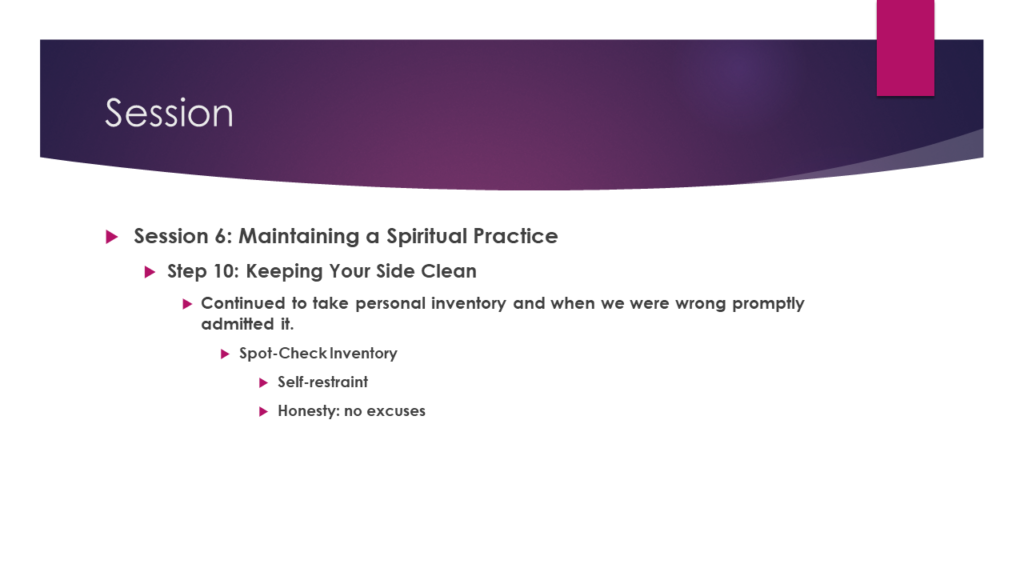
Knee-jerk reactions always paint a picture in our minds that we are the victims of aggression. That’s a lie. No matter what anyone does “to” us, we never need to play the victim. Victimhood is an old, obsolete, ineffective, and unhealthy response to others’ behavior. Our reactions can never be anyone else’s fault. They are ours and ours alone. Only we are responsible for them. We aren’t in the business of correcting or punishing others for their behavior. If we need to act, it must be considered, deliberate, defensive, or used only in order to stop aggression against ourselves or others. If we feel the need to explain or excuse our actions, we’re again using rationalization to avoid taking responsibility for our words and actions.
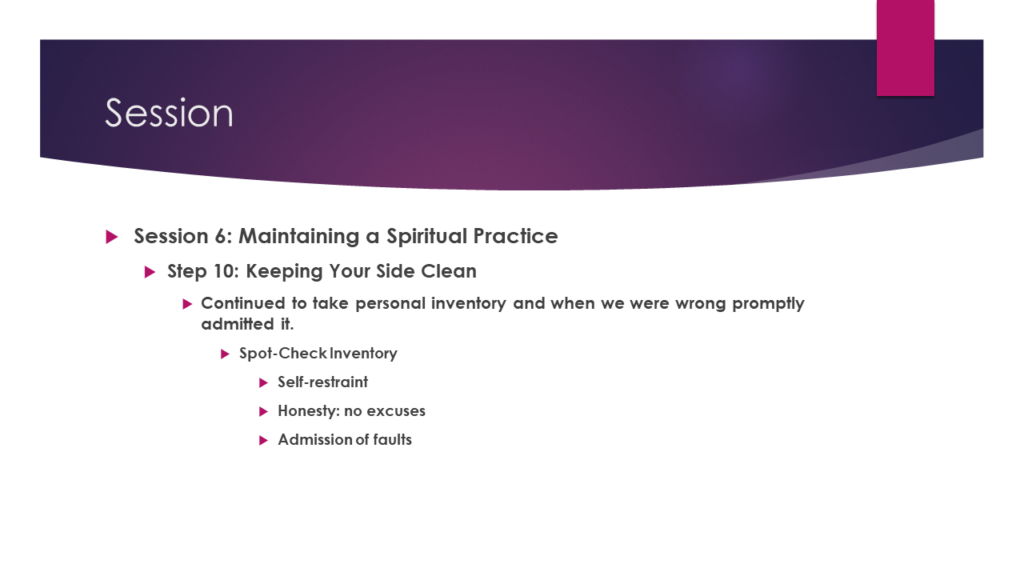
So, we’ve experienced an emotional disruption, we’ve stepped into the stimulus-response space, we’ve chosen what we thought was a reasonable response, but after a moment’s reflection, we realized that our reaction was inappropriate or out of proportion for what was called for. In short, we were wrong. We know what to do now. “I was wrong. I apologize. It won’t happen again.” We don’t delay, we don’t wait for a more opportune moment. We apologize promptly.
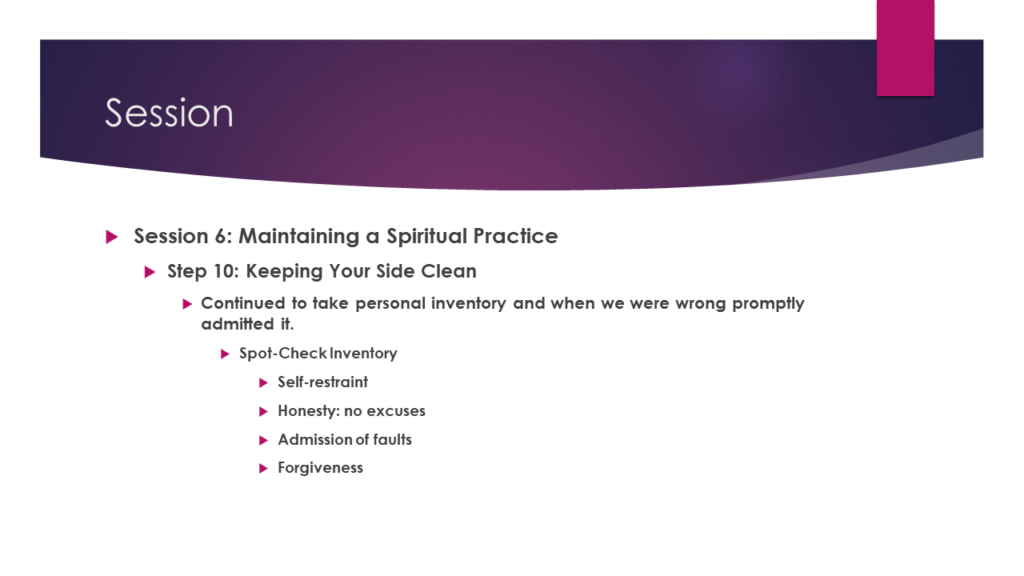
What if our opponent was being rude, thoughtless, uncaring, aggressive, and unjust, harming us or the people we love without cause? Well? What about it? What does that have to do with you? Whatever is going on with your opponent, is all about them, not you. Regardless of how their behavior may be harming you, it’s harming them at least as much. Your only job is to keep your side of the street clean, to react appropriately, and to let it go. Are we required to forgive our aggressors? Only if we want to continue growing spiritually. Holding on to grudges only hurts us. It’s like drinking poison so that the other person will die. Forgiveness is for us, and it’s not that hard, so long as we understand that forgiveness does not mean approval. Forgiveness only means that we have chosen to let it go. Punishment and retaliation are not in our job descriptions. We’re not that powerful; we’re not in control. In fact, we’re powerless, and forgiveness is our only reasonable option.
So, we’ve reacted, we’ve taken a spot-check inventory of how we reacted, and if we were wrong, we promptly admitted it. What now? What if we were wrong? Are we in trouble?
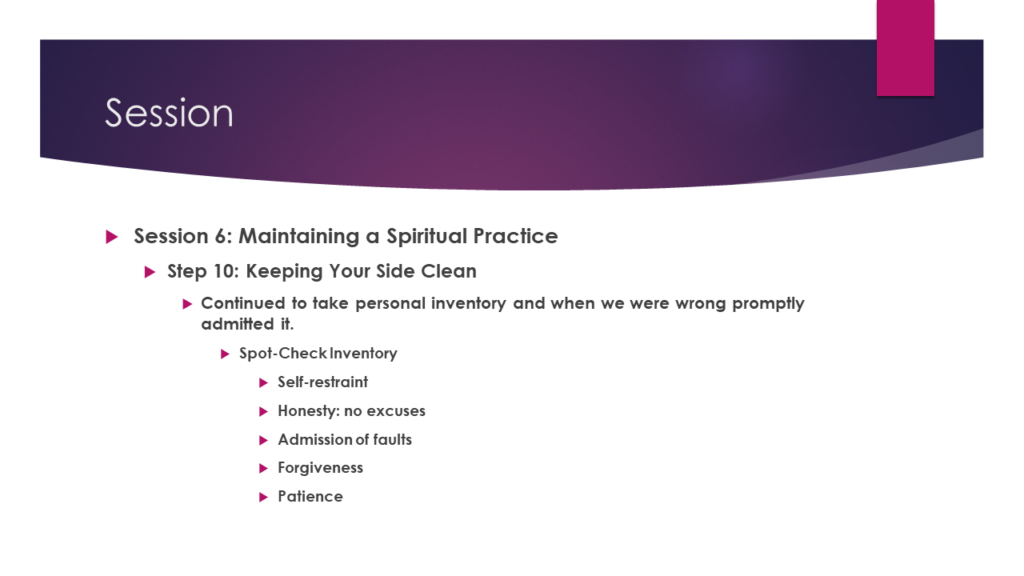
The goal of living these steps is spiritual growth. Will we ever achieve spiritual perfection? No, never. There’s always more to learn and further to grow. If we become impatient with ourselves or the process, we’re being self-defeating. Perfectionism is a character flaw. As we shall see, acknowledging both our progress and failures leads only to a sense of gratitude for how the power of God is working in us. Recognizing and acknowledging our faults and our need for growth is, in itself, a gift from God. We once were oblivious, but now we are aware, were blind, but now we see.
That’s the spot-check inventory. Let’s talk about periodic personal inventories.
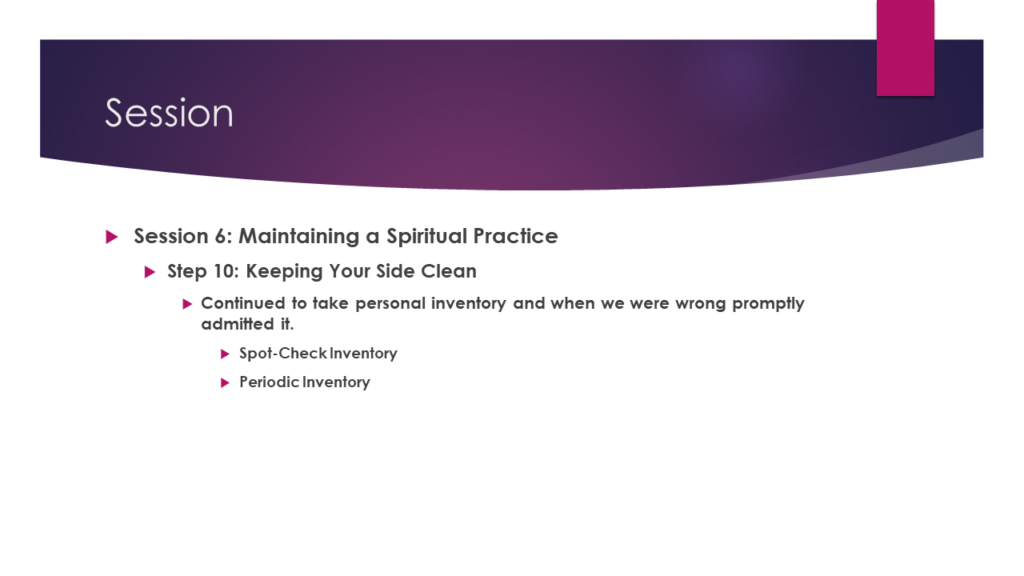
There are different kinds of periodic inventories. They can be daily, semi-annually, annually, or at any other time when you feel the need. The most highly recommended is the daily inventory in the evening before bedtime. Many people include this with their night prayers. It’s our chance to review our day and take stock of how we’ve done.
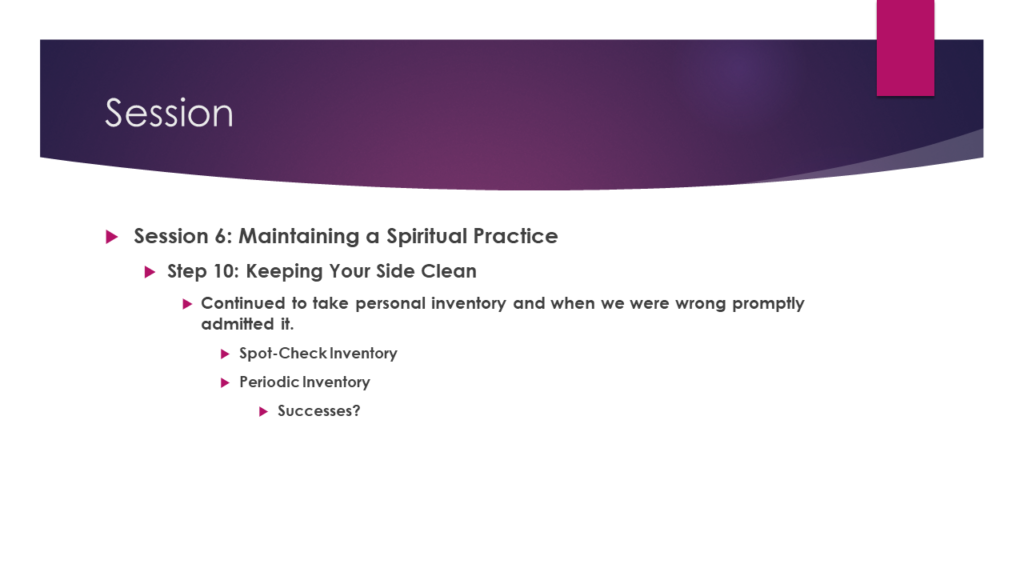
As they go through this inventory, many people neglect to examine their successes. Look at those times when you were challenged to react, but you didn’t. Are there any times when you used to react in a certain negative way in the past, but have changed your behavior? It’s an opportunity for you to bolster your sense of self-worth and self-esteem as you realize how far you’ve already come. It’s also an opportunity for gratitude to God who has granted you the grace and strength to grow not only spiritually, but mentally and emotionally as well. After all, spirituality encompasses the whole person.
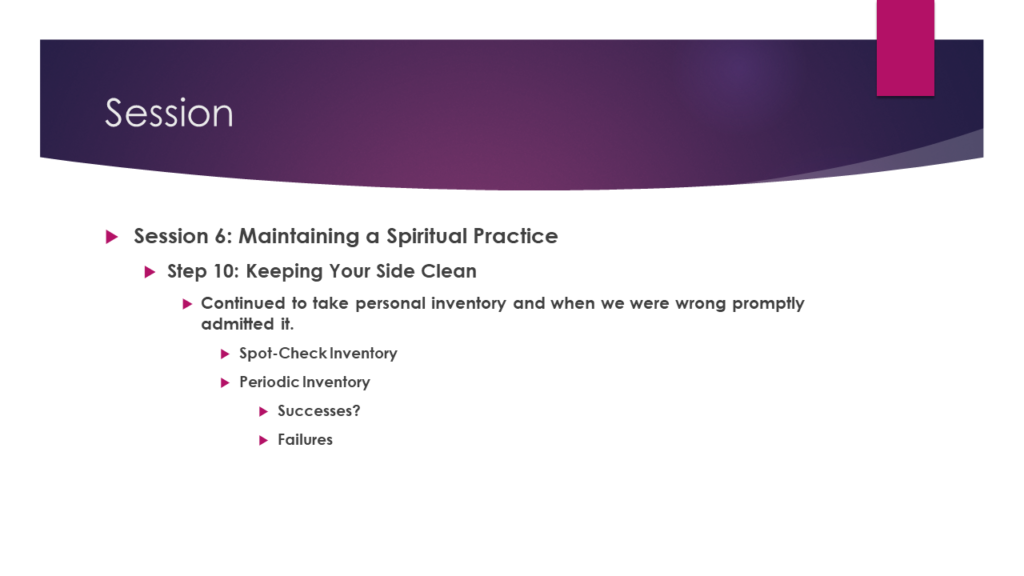
Then, of course, there are your failures—the times you forgot your powerlessness and tried to take your will back and do it your way. As I mentioned a moment ago, there will always be those times. This is not the time to wallow in shame for our failures. What we can do is mentally analyze what went wrong. Which of our character defects were in play? We can do a quick sixth and seventh step right now, especially if we’re already on our knees, humbly asking God to remove these defects of character.
Some people make their periodic inventory more formal by writing them out, especially when they’re doing a big review, like annually or semi-annually. You already have all the forms necessary to redo a formal fourth, fifth, sixth, seventh, eighth, and ninth step, covering all the time since your last formal review. You might even be able to come up with a simplified tenth step review form yourself that will work for you if and when you do such a formal review.
There are a number of attitudes—we might call them virtues—that will guarantee your tenth step will be fruitful.
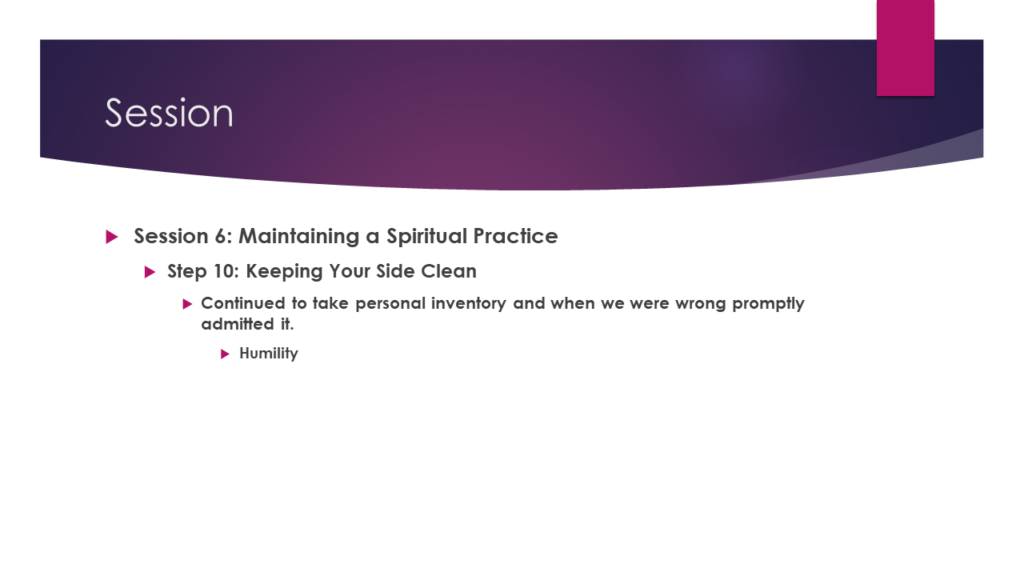
The first one is the essential virtue of humility. Humility keeps us from imagining ourselves as victims, making excuses, or seeing ourselves in the position of teaching someone else a lesson. Humility keeps it all about us and refuses to pass judgment on the behaviors of others. Humility keeps it real.
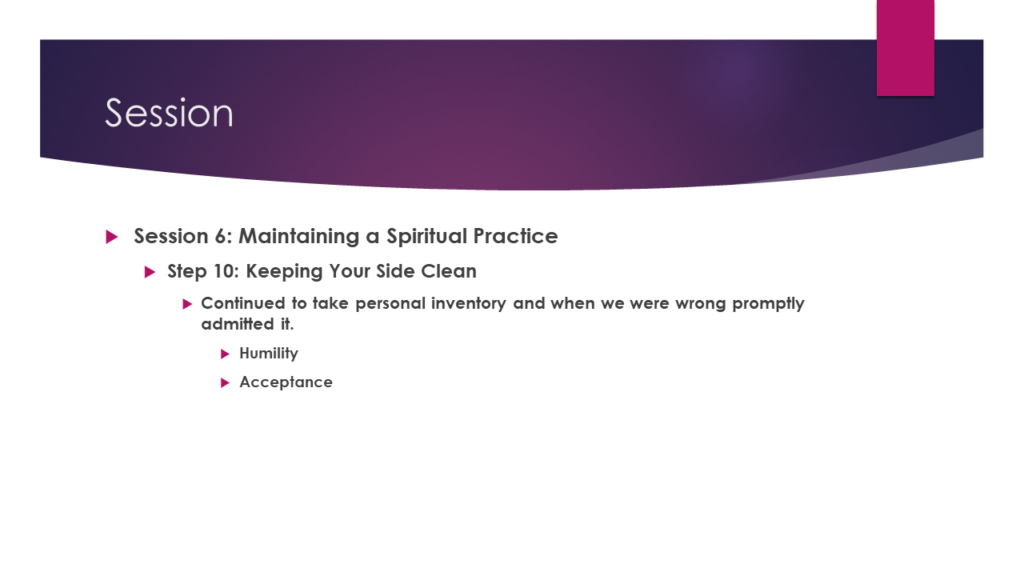
Acceptance allows us to be okay with the world as it is, rather than becoming distraught because persons, places, things, and even we ourselves aren’t the way we would like them to be. Someone defined acceptance as “the practice of non-interference.” Acceptance means letting things be what they are without wishing they were different or needing to change everything to suit ourselves. Once we’ve learned to live in acceptance, we’ll be amazed at how smooth our lives have become. The more frequent and effective our tenth steps are, the easier it is to “let go and let God.”
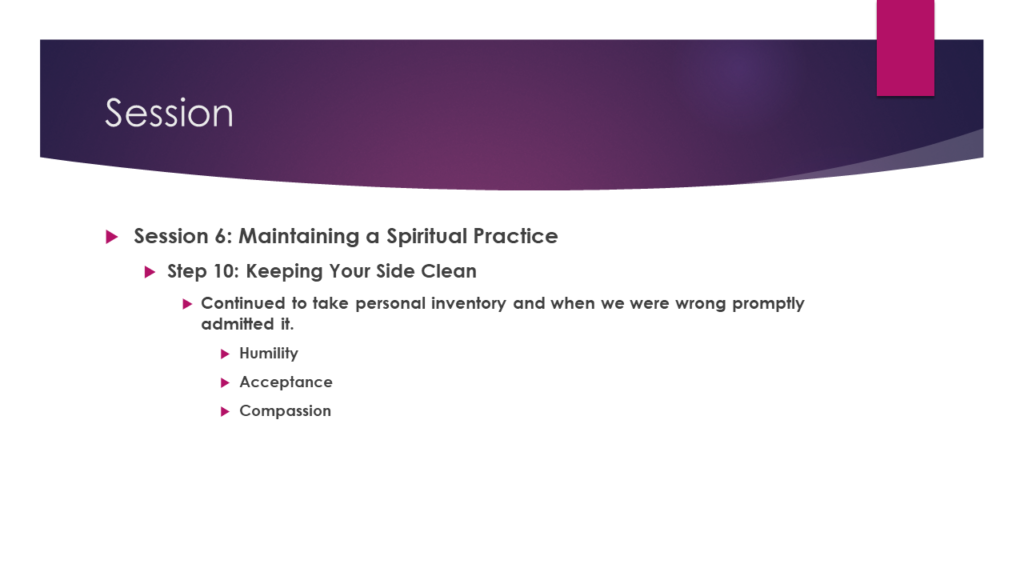
Contrary to popular opinion, people do not need to earn our respect. If we can accept that we’re all in this world together and that we share a powerlessness and a common Higher Power we call God, then people deserve our respect simply because they are fellow human beings. Their unhealthy attitudes and bad behavior cannot rob them of their intrinsic humanity. Rather than condemn them in our minds and hearts, the tenth step requires that we look on them all with compassion. Just because they are sick and suffering, that doesn’t absolve us from what we owe them as fellow creatures. We owe them common courtesy, human kindness, and social justice. And, if we properly understand that love is a decision to give of ourselves and not an emotion, we’ll see that, regardless of who they may be, we can love them. What they do for or to us, then, is none of our business. Spirituality means rising above it all, by the power of God. That takes us to Step 11.
